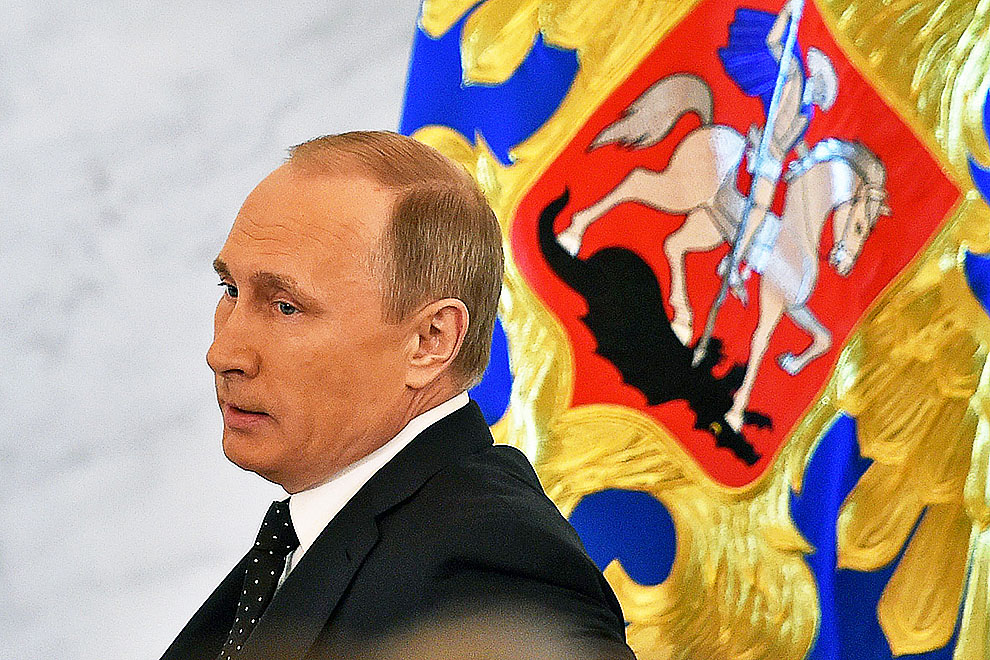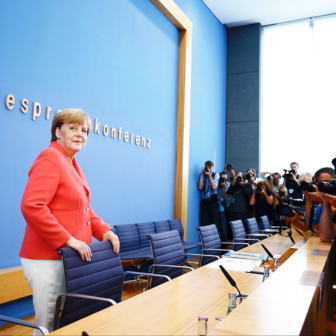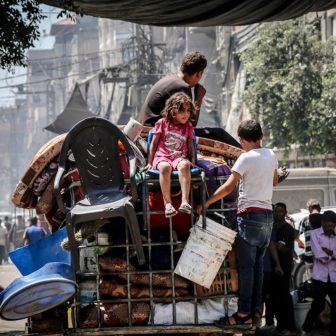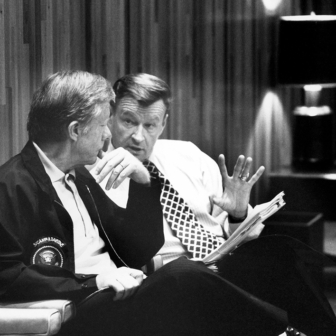Ukraine has largely disappeared from our antipodean media in recent months, and is much less prominent even in Europe and North America. In this case, though, no news is not necessarily good news. At best, the shaky Minsk II ceasefire of 12 February 2015 somewhat reduced the fighting in eastern Ukraine. Then, suddenly, on 1 September, following a third agreement between the parties, it morphed into a genuine ceasefire just as Russian forces began moving into Syria. Putin had decided to change the subject by intervening in Syria and calling for a broad alliance with the Western powers against Islamic State. To improve Russia’s standing, he had prevailed on his truculent proxies in the “people’s republics” of Donetsk and Luhansk to refrain till further notice from making aggressive statements, attacking Ukrainian positions or holding phoney elections outside the Minsk agreements.
The underlying situation in Ukraine did not improve, but the steady drip of casualties suddenly halted. For many Western commentators and politicians, this fuelled a hope that lasting peace was not far off. Few sufficiently noted the point made by political scientist Alexander Motyl, that the sudden suspension of the proxy aggression against Ukraine showed that Russia’s claims that it hasn’t been involved in Donbass were absurd. And what can be so easily turned off can easily be turned back on again – and in recent weeks has been, to some degree.
Other crises affecting Europe have been competing with Ukraine for space. The many permutations of the Greek insolvency crisis were sorely preoccupying EU leaders as well as attracting media attention, until it was pushed into the background by a growing avalanche of migrants. Increasing numbers were coming from Syria (and elsewhere) via refugee camps in Turkey, Jordan and Lebanon, and crossing from Turkey to adjacent Greek islands rather than taking the longer and more hazardous journey from North Africa. Then, while the European Union struggled with its migration crisis, Russia launched itself forcefully into the already crowded Syrian war zone.
Next came the downing of the Russian Metrojet passenger plane over the Sinai Peninsula, followed by the terrorist atrocities in Paris, both claimed by ISIS, and exerting their usual hypnotic effect on Western publics. Most recently, the shooting down of a Russian military aircraft on the Turkish–Syrian border, after its incursion into Turkish airspace, led to yet another crisis involving an aggrieved and aggressive Russia.
All of these things relate to Ukraine’s still very precarious position in significant ways. What they have in common is that not only do they occupy column inches, but they also take a heavy toll on the attention spans, financial resources, political capital and collective resolve of Western decision-makers, all necessarily at the expense of other priorities. From Putin’s point of view, they offer a chance to change the subject from Ukraine and sanctions.
Most independent Russian observers thought that pursuing a better settlement in Ukraine and relief from sanctions was probably the most important motivation for Moscow’s Syrian intervention. But it was clearly also aimed at other objectives: to shore up Russia’s oldest ally in the Middle East, to lay a claim to great power status and a place at any negotiating tables, to demonstrate that Putin, unlike Obama, is loyal to his friends (compare Assad with Mubarak), and to defend and extend Russia’s only military base in the Middle East and the Mediterranean. The intervention may even have been motivated in part by a desire to take on ISIS, as Putin proclaimed at the outset, though for weeks 90 per cent of Russia’s attacks ignored ISIS targets and were aimed rather at Western allies among the anti-Assad forces. It was certainly intended to impress on Western minds that Russia was a necessary ally against ISIS, an ally worth placating to bring on board.
After it became clear that Western governments rejected Putin’s pretence to be taking on ISIS, and particularly after the attacks in Paris, Moscow changed its line, belatedly acknowledging that the Russian passenger jet had been blown up by ISIS, which till then it had energetically denied, and offering sympathy and armed support to French president François Hollande. Russia summoned other countries to join a united front against terrorism, which it presented as analogous to the wartime alliance against Nazi Germany, a line it has been pushing since well before its Syrian intervention. These siren calls often explicitly proposed that Western countries put issues like Ukraine behind them. But while indicating a readiness to coordinate efforts against ISIS, most Western majors made clear that they were not ready to overlook other issues dividing them from Russia. The politically beleaguered Hollande, by contrast, responded with alacrity and enthusiasm to Moscow’s appeal, raising further doubts in some minds about the strength of his commitment to maintaining a strong line over Ukraine.
Like the Metrojet disaster, the Turkish shooting down of a Russian bomber was a severe reverse for Putin. This time he immediately went on the front foot, moving more forces into the region, launching the usual Russian trade war despite the considerable cost to Russian consumers, tourists and small businesses, and demanding a public apology from Turkish president Recep Tayyip Erdoğan. A rising crescendo of propaganda was directed against this new enemy, much of it personal to Erdoğan. All this was probably an expression of Putin’s personal feelings of humiliation, but clearly such an affront could not be tolerated by a great power. Russia is maintaining its rage, and further escalation is possible, though unlikely.
The rights and wrongs of the incident may take some time to become fully clear, but it should be remembered that Putin has been deploying aircraft close to, or in, other countries’ airspace for well over a year. These overflights, especially though not exclusively directed at NATO members, often seem deliberately provocative or intimidatory. The Russian aircraft fly with their transponders turned off so that the air defence and air traffic control systems in targeted countries cannot contact the pilots. Nor was this the first time Russia had treated Turkey in this way during the current operations. The Turkish claim that the Russian crew had not responded to successive warnings is therefore plausible. Moreover, the bombers were attacking ethnic Turkish anti-Assad forces rather than ISIS. Putin has made much of Russia’s supposed right and duty to protect anyone who can be classed as belonging to the rubbery entity known as the Russian world – ethnic Russians, that is, or even just Russian speakers in foreign countries. Why should Turkey not feel some responsibility to its own co-ethnics?
While it may not have been the primary purpose of these dangerous operational procedures near the Turkish border, Russia has shown signs of satisfaction with the nervous NATO response the border incident evoked. This seems to have been the first time a NATO country has shot down a Russian or Soviet aircraft. Moreover, Erdoğan is not flavour of the month with either NATO or the European Union. Though Brussels is offering Ankara some $4 billion in funding and other concessions to persuade it to cooperate in stemming the vast flow of would-be migrants who have come through Turkey, this is a sign of EU desperation rather than esteem.
NATO is, of course, obliged under Article 5 of the NATO treaty to consider what it can do to aid any member whose security is under threat. But some NATO members will be asking themselves whether they want to come to the aid of a Turkey that feels emboldened in ambiguous circumstances to shoot down a Russian aircraft. Russian commentators are clearly hoping this will prove to be the case.
What these events illustrate is that while Moscow may not have provoked or planned all these situations, it has been quick to turn them to its strategic advantage. If Russia deals with Turkey in a contemptuous and threatening manner and NATO responds mainly by declaratory support and mediation efforts, tempered by evident unease, this may suggest that NATO membership is of uncertain value. And if the Paris atrocities in tandem with the Metrojet disaster do generate a wave of sentiment in favour of a new alignment with Russia, that may well weaken Western solidarity in defence of Ukraine. Divisions and uncertainty within NATO or the European Union are always welcome in Moscow.
Even Moscow’s involvement in the Grexit issue was clearly aimed at more than simply supporting a traditional Russian ally, particularly one gripped by anti-Brussels sentiment. Mutual high-level visits between Moscow and Athens, and symbolic gestures of support were timed in such a way as to encourage Athens’s resentment of the tough conditions attached to the EU bailout. Of course, Russia itself was not able or prepared to come to the financial rescue, given the vast sums involved. But the contrast between warm-hearted, sympathetic Russia and mean, hard-hearted Germany was good political theatre and stirred up extra trouble in the European Union. In the end, however, Greek prime minister Alexis Tsipras proved more soberly calculating than Putin had hoped, and he did not withhold his support for extending EU sanctions.
Though some Eastern European commentators believe otherwise, Putin appears to have had no significant role in creating the migration tidal wave in Europe, though his intense bombing raids in Syria might well add to it and perhaps partly reflect a desire to bring about such a movement. And Russia has indeed facilitated a rapidly increasing flow of some 5000 would-be migrants into Norway across the remote northern border linking the two countries, overwhelming Norwegian reception facilities. Oslo has demanded an explanation and amended its regulations to stem the flow. The numbers are small at this stage, but the intent is clear.
Putin would be delighted with the spectacle of EU embarrassment and disarray in the face of this human rights policy debacle. It threatens to open up a new and damaging divide between “core Europe” and new members in the east who are vigorously resisting efforts to make them accept allocations of refugees for resettlement. The refugee crisis is also a gift for Putin’s allies and admirers on the European hard right, including Marine Le Pen and her National Front in France. Le Pen is frequently invited to visit senior figures in the Kremlin, and her party has received funding from a Kremlin-friendly bank. Moscow supports all hard-right Eurosceptic parties, as well as hard-left parties, valuing their disruptive role in a European Union staggering under the weight of successive crises. The migration issue promises to be the mother of all of them, and of long duration.
Russia itself has a severe problem with its increasingly radical Muslim communities, which comprise over twenty million in a total population of 142 million if migrant workers from the “-stans” of former Soviet Central Asia are included. This may have been a key factor inclining Putin initially to avoid stirring up ISIS unduly in Syria, as that organisation had been recruiting substantial numbers of Muslim radicals from Russia, and especially from the turbulent north Caucasus. Stalin committed barbarous crimes against some of those national groups, including the Chechens and also the Turkic-speaking Crimean Tatars who have strong links with and enjoy official and public sympathy in Turkey. The Chechens and Crimean Tatars, like the overwhelming majority of Russian Muslims, are Sunni.
For all these reasons the Sunni Erdoğan keenly resents Putin’s annexation of Crimea, and his support for Shiite regimes in Damascus, Tehran and Baghdad, as well as for Hezbollah in southern Lebanon. In fact, Putin himself has done much to fan the flames of Muslim resistance in Russia and to push it in an increasingly Islamist direction, by his violent repression in the north Caucasus, especially in Chechnya. Having conducted a brutal war to pacify the province at the outset of his presidency (a war that greatly boosted his popularity), he has increasingly outsourced rule in Chechnya to the brutal but efficient and increasingly Islamist dictator, Ramzan Kadyrov.
So Putin has a serious problem with radical Islam domestically, which is one reason why he had till recently steered clear of armed involvements in the Middle East. The Soviet regime tended to support supposedly “modernising” anti-Western autocracies and movements in the region, including Gamal Abdel Nasser in Egypt, Saddam Hussein in Iraq, Muammar Gaddafi in Libya, and the Baathist regime of the Assads in Syria. In the post-Soviet period, at least until recently, Russia has been less actively engaged in the Middle East, but Putin now seems ready to risk greater involvement.
Especially since Putin came to power, Russia has deeply resented Western support for regime change not just in former communist states in Eastern Europe, but also in Afghanistan, Iraq and Libya (where Putin seemed to take the fall and execution of Gaddafi personally). Moscow was, perhaps wisely, sceptical that the Arab Spring would lead to any kind of sweetness and light. Putin is convinced that the real Western motivation there is to strengthen its influence in the region at the expense of Moscow’s political and economic interests.
And he is apparently genuinely mystified that the West should repeatedly invest so much blood and treasure in such dangerous and volatile situations. It is not just damaging to Russia, it is damaging to the West as well, so why do it? To quote the rhetorical question in his UN address in September 2015 referencing Western-led regime-change operations in the broader Middle East: “Do you at least realise what you’ve done?!” It’s not an unreasonable question. Yet he now seems on the brink of a dangerous double investment of his own, first in the whole Middle Eastern Sunni–Shia civil war, and second in a vengeful feud with a man after his own heart, Erdoğan, which could severely damage his carefully cultivated relationship with Turkey, and possibly much more besides.
Russians generally, including opposition voices, find the Western attitude to the wider Middle East, and particularly to Muslim immigrants in their midst, deeply strange. The once prominent Russian banker Elena Kotova, writing about the Paris atrocities for the independent Russian online publication Snob, expressed amazement that Western elites react to all Islamist terrorist attacks in Western countries with the same clichés about solidarity, tolerance, courage, civilised values inevitably triumphing, and so on. After years of changing reality, she wrote, the tolerance mantras remain the same. They defy common sense, she argued, but more importantly they defy the wishes of the majority of ordinary citizens of Europe. And she went on to make some mordant observations about the tyranny of political correctness in Western Europe.
The common thread in all these recent headline issues from the Putinist perspective is that they carry the promise of, or present opportunities for, the weakening of NATO and the European Union, and the West generally. As Putin once frankly told a secretary-general of NATO, his mission was not to build a better relationship with NATO, but to destroy the organisation. And his attitude in recent years towards the European Union, especially its trade and governance outreach to its eastern neighbours, has become similarly hostile.
For Putin generally, as for his senior colleagues, the objective of policy is not to reach an honourable compromise, or to achieve peace as such, but to be in conflict with and defeat his numerous adversaries. All relationships are zero-sum games, and win–win solutions are an illusion – or would be if Russian had a word for them. What he wants is victory, not peace, domination not partnership (despite his frequent sly references to his Western enemies as “partners”). Kto kogo (who will dominate whom), as Lenin famously said; the weak get beaten, as Putin himself said. And he assumes that behind their hypocritical facades everyone else operates in the same way.
Because of the dismal state of Western education about the Soviet and post-Soviet operational code, Western foreign policy–makers (and often commentators, too) seem unable to internalise these sorts of basic Russian realities. They continue to try to create resets or peaceful win–win solutions, to “rebuild the relationship,” to reach out, until their patience runs out, or they lose the election, or they are replaced by a democratic party colleague with superior insight into the nature of things, who will also see a need to rebuild the relationship supposedly damaged by her predecessor. •




